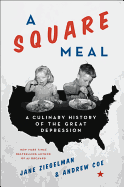
Is eating dairy patriotic? The 1922 United States government thought so. In A Square Meal: A Culinary History of the Great Depression, historians Jane Ziegelman (97 Orchard) and Andrew Coe (Chop Suey) chronicle the government's evolving approach to researching and overseeing how its citizenry ate during the decades spanning the World Wars. Ziegelman and Coe probe motives that drove Herbert Hoover and Franklin Roosevelt to make tough and sometimes callous policy decisions, also profiling significant female figures, like Louise Stanley and Flora Rose, at the forefront of nutritional science and home economics.
This is as much a history of food science as it is compelling portraits of the faces in the breadlines, of leaders, eaters, and the ubiquity of "white sauce." The writing is measured and clear, with occasional droll forays: "Who but a WASP could think up a diet based around milky chowders and creamed casseroles?" Sources like newspapers, letters, lyrics, literature, menus and recipes (one fright: "Pea Roast," an arranged marriage of peas and peanuts for protein's sake) highlight ingenuity. Each page brims with interesting facts: Vitamin A? So-named because it was the first discovered. B? "The vitamin with sex appeal."
The authors include experiences of people of varied class, race, and ethnicity, and their fundamental questions are timeless: what does a government owe its citizens? How is charity best dispensed? Ultimately, A Square Meal evokes a window into the past through which not only to see but to taste history, inspiring appreciation for living in a time of plenty. --Katie Weed, freelance writer and reviewer

